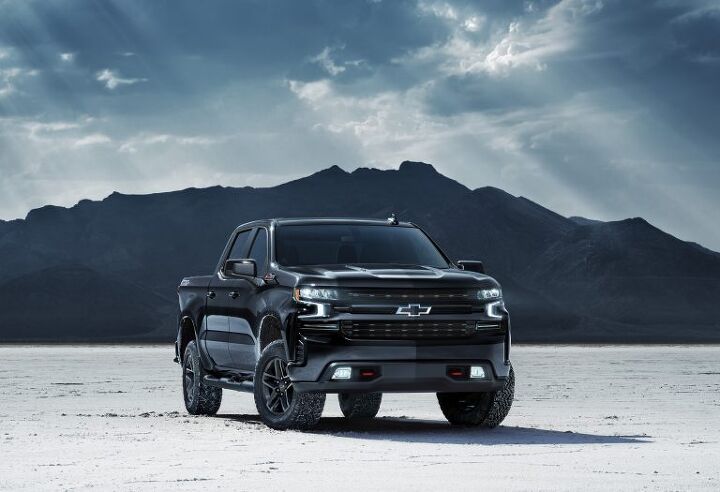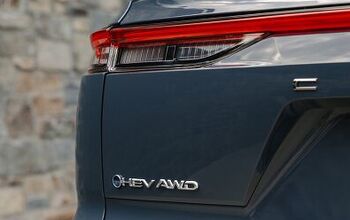GM Recalls More Than 900,000 Vehicles Worldwide Over Brake and Battery Issues

General Motors is recalling more than 900,000 vehicles across the globe to addresses issues from separate campaigns — one of which poses an always-exciting fire risk. On Thursday, the automaker announced a callback of more than 400,00 Chevrolet Silverado and GMC Sierra 1500 trucks from the 2019-2020 model years. The manufacturer is concerned that pickups’ battery positive cable rings may have been installed with excessive glue, creating a stalling risk, or in some instances a potential fire hazard.
Another 550,000 Chevrolet Silverado 1500, Cadillac CT6, and GMC Sierra 1500 models from 2019 will also need to be recalled. A potential software issue related to the vehicles’ service brake system notifications could cause it to go haywire, negatively impacting their electronic stability control (ESC) and anti-lock braking (ABS) functions.
According to Reuters, GM claims the vehicles’ diagnostic system will not illuminate the instrument cluster alert when the issue arises, but ABS and ESC will effectively be disabled until engineers reflash the software. The manufacturer believes the problem is exceedingly rare and should not affect most of the models under suspicion. GM issued a similarly large recall (roughly 638,000 vehicles) on slightly older trucks and SUVs earlier this year due to a faulty wheel-speed sensor. It also impacted braking and sent the vehicles’ software into error mode, providing an elevated crash risk at the same time.
Meanwhile, the glue-related recall only requires a visual inspection. From there, impacted components can be replaced with new rings installed using the appropriate amount of glue.
While no injuries are linked to the campaign, General Motors did cite one fire report. Details of the issue apparently emerged from the factory after a Canadian employee noticed the stalling issue. The manufacturer should begin notifying impacted owners before the end of next month.
[Image: General Motors]

A staunch consumer advocate tracking industry trends and regulation. Before joining TTAC, Matt spent a decade working for marketing and research firms based in NYC. Clients included several of the world’s largest automakers, global tire brands, and aftermarket part suppliers. Dissatisfied with the corporate world and resentful of having to wear suits everyday, he pivoted to writing about cars. Since then, that man has become an ardent supporter of the right-to-repair movement, been interviewed on the auto industry by national radio broadcasts, driven more rental cars than anyone ever should, participated in amateur rallying events, and received the requisite minimum training as sanctioned by the SCCA. Handy with a wrench, Matt grew up surrounded by Detroit auto workers and managed to get a pizza delivery job before he was legally eligible. He later found himself driving box trucks through Manhattan, guaranteeing future sympathy for actual truckers. He continues to conduct research pertaining to the automotive sector as an independent contractor and has since moved back to his native Michigan, closer to where the cars are born. A contrarian, Matt claims to prefer understeer — stating that front and all-wheel drive vehicles cater best to his driving style.
More by Matt Posky
Latest Car Reviews
Read moreLatest Product Reviews
Read moreRecent Comments
- Analoggrotto Does anyone seriously listen to this?
- Thomas Same here....but keep in mind that EVs are already much more efficient than ICE vehicles. They need to catch up in all the other areas you mentioned.
- Analoggrotto It's great to see TTAC kicking up the best for their #1 corporate sponsor. Keep up the good work guys.
- John66ny Title about self driving cars, linked podcast about headlight restoration. Some relationship?
- Jeff JMII--If I did not get my Maverick my next choice was a Santa Cruz. They are different but then they are both compact pickups the only real compact pickups on the market. I am glad to hear that the Santa Cruz will have knobs and buttons on it for 2025 it would be good if they offered a hybrid as well. When I looked at both trucks it was less about brand loyalty and more about price, size, and features. I have owned 2 gm made trucks in the past and liked both but gm does not make a true compact truck and neither does Ram, Toyota, or Nissan. The Maverick was the only Ford product that I wanted. If I wanted a larger truck I would have kept either my 99 S-10 extended cab with a 2.2 I-4 5 speed or my 08 Isuzu I-370 4 x 4 with the 3.7 I-5, tow package, heated leather seats, and other niceties and it road like a luxury vehicle. I believe the demand is there for other manufacturers to make compact pickups. The proposed hybrid Toyota Stout would be a great truck. Subaru has experience making small trucks and they could make a very competitive compact truck and Subaru has a great all wheel drive system. Chevy has a great compact pickup offered in South America called the Montana which gm could make in North America and offered in the US and Canada. Ram has a great little compact truck offered in South America as well. Compact trucks are a great vehicle for those who want an open bed for hauling but what a smaller more affordable efficient practical vehicle.


































Comments
Join the conversation
The good news is that if you disconnect the battery then you don't have to worry about the brake issue.
@Halftruth--Actually I knew about the terminals being glued on. I had a positive terminal on the battery of my 99 S-10 fall off when it was 2 years old. I took the battery into the dealership and they replaced it at no cost. You could see the remnants of the glue on the battery. The terminals were side terminals.